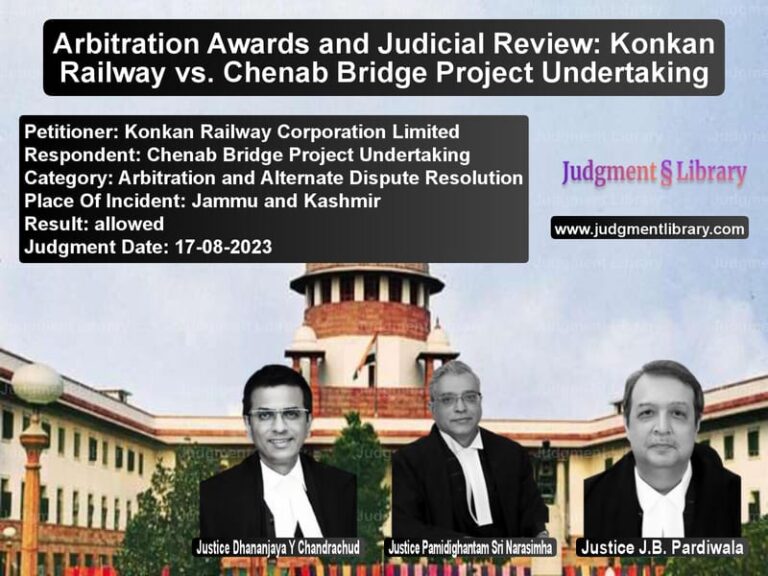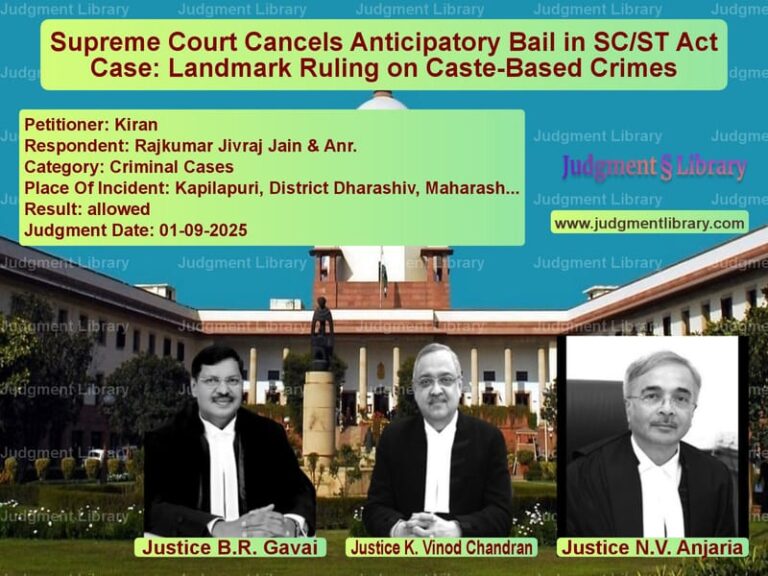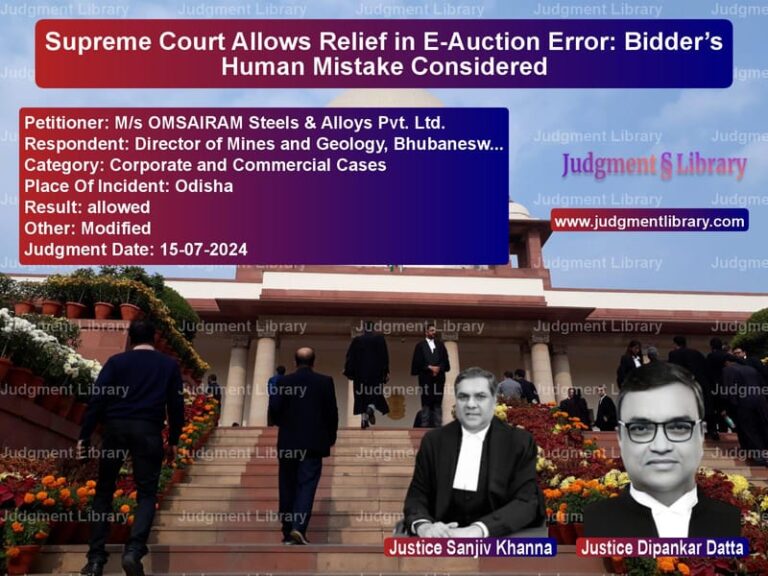Divorce and Desertion: Supreme Court’s Landmark Judgment on Matrimonial Disputes
The case of Debananda Tamuli vs. Smt. Kakumoni Kataky revolves around a matrimonial dispute where the appellant-husband sought a divorce on the grounds of cruelty and desertion under Section 13(1)(ia) and 13(1)(ib) of the Hindu Marriage Act, 1955. The Supreme Court of India examined whether the wife’s prolonged separation and lack of intention to resume cohabitation constituted desertion, ultimately granting the divorce.
The case highlights the legal principles surrounding desertion in matrimonial law and the evolving stance of courts in cases where marital relationships have irretrievably broken down.
Background of the Case
The appellant and respondent were married on 17th June 2009 at Tezpur, Assam. However, the appellant claimed that from 30th June 2009, the respondent-wife left the matrimonial home with all her personal belongings and never returned. He filed for divorce on 9th September 2011, citing cruelty and desertion.
The appellant’s primary allegations were:
- The wife consistently refused to consummate the marriage, causing him mental agony.
- She deserted him from 30th June 2009 without reasonable cause and never attempted to return.
- Even when she visited the matrimonial home on 21st December 2009, it was only for a day due to his mother’s demise and did not amount to resumption of cohabitation.
The District Court dismissed the appellant’s petition for divorce, which was upheld by the Gauhati High Court. The appellant then approached the Supreme Court.
Legal Dispute Over Desertion and Cruelty
The primary legal issues before the Supreme Court were:
- Whether the refusal to consummate the marriage constituted mental cruelty.
- Whether the wife’s absence from the matrimonial home for over two years constituted desertion under Section 13(1)(ib) of the Hindu Marriage Act.
The appellant argued that both elements were satisfied, while the respondent contended that she had never deserted her husband and that the marriage had been consummated.
Arguments Before the Supreme Court
Appellant’s Arguments
The appellant’s counsel made the following arguments:
- The wife refused to consummate the marriage, which amounted to mental cruelty.
- She left the matrimonial home within 13 days of marriage and never showed an intention to return.
- Her visit in December 2009 was only due to his mother’s death and did not indicate an attempt to reconcile.
- The legal definition of desertion requires both physical separation and intent to permanently abandon the marital relationship, which was evident in this case.
Respondent’s Arguments
The respondent’s counsel countered:
- The appellant failed to prove that the marriage was not consummated.
- She had visited the matrimonial home, showing that she had no intention of permanently abandoning the marriage.
- The burden of proving desertion was on the husband, which he failed to meet.
- Article 142 of the Constitution should not be used to dissolve a marriage unless irretrievable breakdown is recognized as a legal ground for divorce.
Supreme Court’s Judgment
The Supreme Court ruled in favor of the appellant, granting him a decree of divorce on the ground of desertion. The key findings were:
- The wife had not made any effort to resume cohabitation since June 2009.
- Her brief visit in December 2009 did not indicate an intention to reconcile.
- There was no evidence to suggest that she was willing to return to the matrimonial home.
- The legal threshold for desertion was met, as the respondent had abandoned the matrimonial home without reasonable cause for more than two years.
The Supreme Court observed:
“The deserted spouse must prove that there is a factum of separation and an intention on the part of the deserting spouse to bring cohabitation to a permanent end. The evidence in this case clearly establishes animus deserendi on the part of the respondent.”
Key Observations from the Judgment
- Desertion must be intentional and not merely a result of separation.
- The spouse claiming desertion must prove both the fact of separation and the other spouse’s intention to abandon the marital relationship.
- A brief visit does not amount to an attempt to reconcile unless accompanied by a genuine effort to resume cohabitation.
- The Court did not find sufficient evidence to establish cruelty but ruled that desertion was clearly proven.
Financial Settlement
Considering the prolonged litigation, the Supreme Court directed the appellant to pay Rs. 15,00,000 to the respondent as a lump sum settlement. The Court stated:
“The appellant shall deposit Rs. 15,00,000 in this Court within eight weeks. The respondent is permitted to withdraw this amount along with Rs. 50,000 already deposited.”
Conclusion
This ruling sets an important precedent in divorce cases based on desertion. The Supreme Court reinforced that desertion is not merely physical separation but also requires an intention to permanently abandon the marital relationship. By recognizing prolonged separation and lack of effort to reconcile as proof of desertion, the judgment provides clarity for future matrimonial disputes.
Additionally, the Court’s decision to award financial compensation to the wife reflects a balanced approach in ensuring that the dissolution of marriage does not leave one spouse in financial hardship.
Petitioner Name: Debananda Tamuli.Respondent Name: Smti Kakumoni Kataky.Judgment By: Justice Abhay S. Oka, Justice Ajay Rastogi.Place Of Incident: Tezpur, Assam.Judgment Date: 15-02-2022.
Don’t miss out on the full details! Download the complete judgment in PDF format below and gain valuable insights instantly!
Download Judgment: debananda-tamuli-vs-smti-kakumoni-kataky-supreme-court-of-india-judgment-dated-15-02-2022.pdf
Directly Download Judgment: Directly download this Judgment
See all petitions in Divorce by Desertion
See all petitions in Judgment by Abhay S. Oka
See all petitions in Judgment by Ajay Rastogi
See all petitions in allowed
See all petitions in Quashed
See all petitions in supreme court of India judgments February 2022
See all petitions in 2022 judgments
See all posts in Divorce Cases Category
See all allowed petitions in Divorce Cases Category
See all Dismissed petitions in Divorce Cases Category
See all partially allowed petitions in Divorce Cases Category







